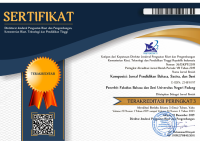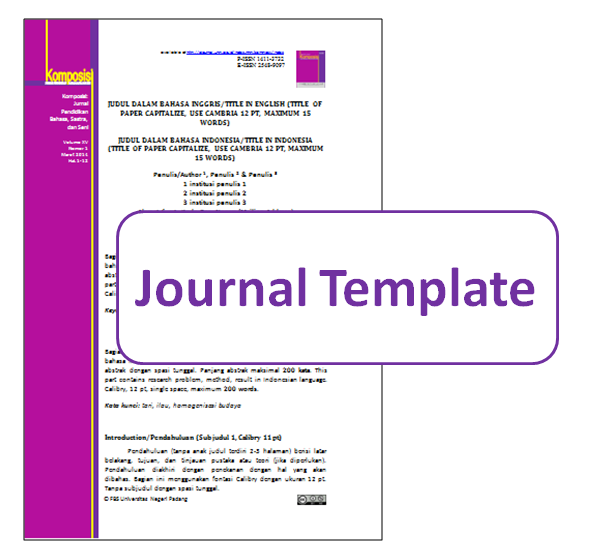The Effectiveness of Using Answer Garden Application as Brainstorming Activity in Online Learning
Abstract
This research is based on the teaching online experience where the learning process becomes less interactive and the atmosphere during online learning was monotonous. By seeing the fact, the researcher is interested to apply an application that seem appropriate to help the students to improve their writing ability in online learning called Answer Garden. The purpose of this research is to solve the problems faced by lecturers who teach writing in universities in Batam. Answer Garden is a new minimalistic feedback tool used to stimulate real-time student participation, online brainstorming, and obtain classroom feedback. The research applied the qualitative research by using observation sheet, field notes, and questionnaire. The results showed that using Answer Garden as Brainstorming activity in online learning gives a good result where students are motivated by the concept because allowing them to generate lists, phrases, thoughts, words, ideas, or questions about a topic of writing in interactive ways. Thus, Answer Garden was seen as a great application to promote student participation during the online learning, because it can involve students brainstorming and collaborating on a topic question that the teacher asked during the online learning.
Keywords
Full Text:
PDFReferences
Ackerman, M. S., & Malone, T. W. (1990). Answer garden. A tool for growing organizational memory. 31–39. https://doi.org/10.1145/91474.91485
Aslan, A. (2021). Problem-based learning in live online classes: Learning achievement, problem-solving skill, communication skill, and interaction. Computers and Education, 171(November 2020), 104237. https://doi.org/10.1016/j.compedu.2021.104237
Barekat, B., & Baniasady, B. (2014). The Impact of Phrasal Verb Avoidance on the Writing Ability of the University EFL Learners. Procedia - Social and Behavioral Sciences, 98, 343–352. https://doi.org/10.1016/j.sbspro.2014.03.425
Botha, A., Steyn, R., Weilbach, L., & Muller, E. (2018). Using the iPeer LMS feature to evaluate peer participation in teamwork for assessment “as learning”: Lessons learned. In Lecture Notes in Computer Science (including subseries Lecture Notes in Artificial Intelligence and Lecture Notes in Bioinformatics): Vol. 11284 LNCS. https://doi.org/10.1007/978-3-030-03580-8_6
Brown, H, D. (2001). Teaching by Principles: An Interactive Approach to Language pedagogy Fourth Edition. Addison Wesley Longman, Inc.
Harandi, S. R. (2015). Effects of e-learning on Students’ Motivation. Procedia - Social and Behavioral Sciences, 181(October), 423–430. https://doi.org/10.1016/j.sbspro.2015.04.905
Hofer, S. I., Nistor, N., & Scheibenzuber, C. (2021). Online teaching and learning in higher education: Lessons learned in crisis situations. Computers in Human Behavior, 121(November 2020), 106789. https://doi.org/10.1016/j.chb.2021.106789
Hussein, E., Daoud, S., Alrabaiah, H., & Badawi, R. (2020). Exploring undergraduate students’ attitudes towards emergency online learning during COVID-19: A case from the UAE. Children and Youth Services Review, 119(August), 105699. https://doi.org/10.1016/j.childyouth.2020.105699
Malik, S., & Rana, A. (2020). E-Learning: Role, Advantages, and Disadvantages of its implementation in Higher Education. JIMS8I International Journal of Information Communication and Computing Technology, 8(1), 403. https://doi.org/10.5958/2347-7202.2020.00003.1
O`Malley, J. Michael, and P. (1996). Authentic Assessment for English Language Learners. Longman.
Popescu, A.-V., Cohen-Vida, M.-I., & Constantin, E. C. (2015). How to Teach Paragraph Writing in a Foreign Language. Procedia - Social and Behavioral Sciences, 191(2010), 1213–1217. https://doi.org/10.1016/j.sbspro.2015.04.225
Rivers.Wilgan M. (1981). Teaching Foreign Language Skill. The University of Chicago.
Selvaraj, A., Radhin, V., KA, N., Benson, N., & Mathew, A. J. (2021). Effect of pandemic based online education on teaching and learning system. International Journal of Educational Development, 85(January), 102444. https://doi.org/10.1016/j.ijedudev.2021.102444
Ulla, M. B., & Perales, W. F. (2021). Facebook as an integrated online learning support application during the COVID19 pandemic: Thai university students’ experiences and perspectives. Heliyon, 7(11), e08317. https://doi.org/10.1016/j.heliyon.2021.e08317
Yuzulia, I. (2021). The Challenges Of Online Learning During Pandemic : Students ’ V oice. 13(1), 8–12.
DOI: https://doi.org/10.24036/komposisi.v23i1.116608
Refbacks
- There are currently no refbacks.
Copyright (c) 2022 Komposisi: Jurnal Pendidikan Bahasa, Sastra, dan Seni

This work is licensed under a Creative Commons Attribution-NonCommercial 4.0 International License.
Komposisi: Jurnal Pendidikan Bahasa, Sastra, dan Seni, a peer-reviewed online journal in languages, literature, and arts education.
Printed ISSN 1411-3732, Online ISSN 2548-9097.
Currently, Komposisi: Jurnal Pendidikan Bahasa, Sastra, dan Seni is indexed by:
Published by:
Universitas Negeri Padang (UNP)
Address: Faculty of Languages and Arts (FBS) Universitas Negeri Padang.
Jl Prof. Dr. Hamka Air Tawar Barat, Padang - West Sumatera -Indonesia
Telp/Fax. +62751 7053363
Home page: http://ejournal.unp.ac.id/index.php/komposisi | e-mail:komposisi.fbsunp @ fbs.unp.ac.id | cc: havid_a @ fbs.unp.ac.id
slot resmi
situs toto
situs toto toto slot
Wanita Subang Beli mobil dari Nolimit city
Gatot kaca Buat TKW Jadi jutawan
Rahasia sukses bermain Mahjing wins
rahasia sukses bermain mahjong ways
div>











